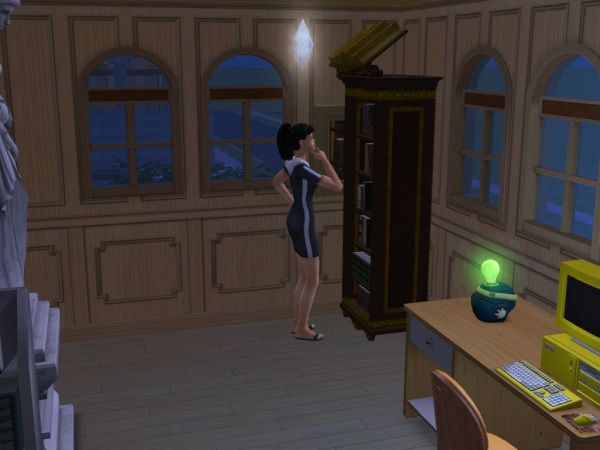In the computer game The Sims 2, in the Seasons expansion, there is a new career called Education. When reaching the higher levels of this career, the simulated person gets a free bookshelf. But this is not just any old bookshelf. It allows the reader to learn any skill, even those not usually of a bookish nature, at double speed.
In the Sim story I am currently writing, the bookshelf falls into the hands of a newlywed couple, both of which are Knowledge sims. That is to say, their main aspiration in life is knowledge and skills. They constantly want to improve their skills, and because this bookshelf lets them do that quickly, they are constantly in Platinum mood, the highest happiness for a sim.
With the FreeTime expansion, the game got another feature: Lifetime happiness. As long as the sims are happy, they very slowly accumulate lifetime happiness. Over time this lets them gain certain benefits, like needing a little less sleep or being content alone for longer. Eventually the lifetime meter reaches its maximum, and the sim from now on is naturally happy all the time for the rest of his or her life.
By the time I took this picture, Jenny (the sim in the picture) had achieved this “permaplat” – permanent platinum mood – of which I have written occasionally in the past. There were a number of things that contributed to that, including her recent marriage, but the final push came from the bookshelf.
In other news, Ryuho Okawa has now written more than 600 books (used to be more than 500). Hermes Trismegistus supposedly wrote several thousand books, covering virtually all knowledge in the ancient world, so his reincarnation definitely has the work cut out for him. (Only a few books by Hermes are preserved from antiquity, and what I have seen from them is pretty cryptic.)
In other news, I bought my first Kindle e-book on Friday. I don’t much like Amazon’s policy of pricing the virtually costless Kindle books higher than paper books. It is insulting and morally wrong, and the trees would almost certainly vote against it. But being able to read on my mobile phone when I don’t carry with me other books is definitely worth ruffling some principles over. The book I bought was Tao Te Ching, the short compilation of the wisdom of Tao, attributed to Lao-Tzu. English translations of his works are generally more like interpretations, since a vast gap in time and culture and language separate the texts. This one is supposed to be particularly faithful to the text, as testified by actual Chinese readers.
I am not a sim, but I am still trying to build my own bookshelf of happiness. I don’t expect whoever inherits my books to gain much joy from them though. Even for humans, it depends on your aspiration. Books of timeless wisdom is not for everyone, more is the pity. And even for us who aspire to knowledge and insight, not everyone finds the same texts easy or joyful to read. So it takes some experimenting, even if you know others who have found lifelong happiness in their reading. Still, it is certainly worth a try, to build your own bookshelf of lifelong happiness.

